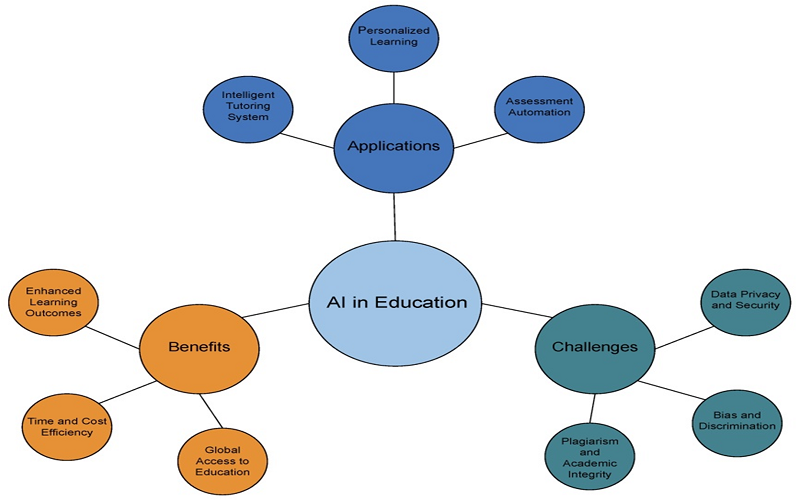Artificial Intelligence in education is the driving force behind the current revolutions in education and is no longer simply a term in the computer industry. Imagine artificial intelligence (AI) as a never-sleeping, massively parallel processing, machine learning, and decision-making assistant. It’s similar to having a fantastic instructor who can tailor instruction to each student. Therefore, educators must find a balance between using AI and maintaining interpersonal connections. Read on to experience this new field of learning and pedagogical growth.
Ways To Balance AI And Personal Touch In Classrooms
As an educator, you must feel overwhelmed while incorporating technology into education. However, to ease your pain, here are a few strategies to try:
1. Build Personal Connections
Make your classroom follow a straightforward pattern that starts with welcoming each kid at the door. This is more than simply a friendly greeting; it’s an opportunity to find out how each pupil is feeling. Recognizing students’ personal lives has been shown to help foster a learning environment.
While AI may aid in learning, an instructor is still crucial in assisting pupils with interpersonal skills about each other and making a connection between the current information and reality. You assist them in realizing the importance of both the topic and themselves.
2. Integrate AI Brainstorming And Feedback
AI is not so much utilized for content production as it is for brainstorming and peer review. With this method, it is guaranteed that students will interact with the content more deeply and acquire critical thinking abilities. AI can do many duties, from fact-checking to analyzing complicated responses.
In addition to ensuring factual correctness, it also does semantic analysis, checks grammar and spelling, looks for plagiarism, and grades math assignments. The list does not end here as it offers consistent multiple-choice grading and assesses the coherence and depth of open-ended responses.
3. Encourage Responsible Use Of AI
Implement a policy requiring students to hyperlink their AI interactions for credit to guarantee the appropriate usage of AI. By doing this they will learn the value of appropriate sourcing from this technique, which also promotes transparency.
To help them successfully attribute AI as a source of peer input, you can also continuously watch how they use it. After qualifying with Doctorate in Education you understand that monitoring students and allowing them to use AI every now helps you to build a bond of trust that will prevent them from misusing the freedom given to them.
4. Make Learning Engaging And Fun
AI aims to make learning enjoyable and engaging, not only about individualized routes. AI uses gamification to turn boring classes into fun games that increase student engagement and retention. When you combine Augmented Reality (AR) and Virtual Reality (VR), you get a completely immersive learning environment.
Imagine studying astronomy by traveling through the heavens, or studying history by digitally exploring ancient Rome. All of this is made possible by AI, which makes learning exciting.
Benefits Of Using AI In The Classroom

Source: mdpi.com
Here Is How AI can transform the learning experience in your classrooms:
Personalized Learning
Artificial intelligence is transforming education by providing personalized learning experiences. Envision a system that is fully aware of both your current knowledge and what you still need to acquire. AI evaluates each learner’s areas of strength and weakness to design a personalized learning plan that changes as the student advances. It functions similarly to a GPS on your educational trip, continuously adjusting the path to suit your preferred pace and method of learning.
Smart And Effective
The core of adaptive learning is these AI-driven systems. They mimic intelligent, adaptable textbooks that instantly change their material and level of difficulty. The system makes a topic harder if you’re doing well on it. It will slow down and provide more resources. This in-the-moment modification maximizes learning effectiveness by guaranteeing that each learner advances at their speed and to the fullest extent possible.
Challenges And Ethical Considerations
Here are some of the challenges you might encounter while introducing AI in your classroom:
Balancing Bias And Fairness
The possibility of algorithms perpetuating prejudices and inequality is a major worry when it comes to AI in education. Because AI systems learn from data, their choices will also be skewed if the data is prejudiced. This may unjustly hurt some student groups and exacerbate already-existing disparities.
To tackle this, deliberate efforts must be made to create impartial AI systems and to regularly check them for equitable results. It’s important to make sure AI promotes equality of opportunity rather than acts as a barrier.
Data Security And Privacy
An AI-powered educational system gathers and analyzes enormous volumes of student data. Serious concerns concerning data security and privacy are brought up by this. How can we make sure that this data is handled sensibly and ethically? In the digital era, student privacy protection is critical.
Building confidence and preserving the integrity of AI in education requires putting in place strong data security regulations and guaranteeing openness in the usage of student data.
The Future Of AI In Education
An AI-powered educational system gathers and analyzes enormous volumes of student data. Serious concerns about data security and privacy are brought up by this. In the digital era, student privacy protection is critical. Building confidence and preserving the integrity of AI in education requires putting in place strong data security regulations and guaranteeing openness in the usage of student data.
AI in education has a bigger picture than just cutting-edge technology; it also aims to improve learning and make it more efficient, inclusive, and customized. The intention is to provide the next generation with the tools they need to succeed in a world where artificial intelligence (AI) is a basic aspect of existence. Imagine a day where education is a dynamic, participatory, lifelong process rather than something limited to textbooks. That is the educational potential of AI.
Empower Learners And Embrace The Future
AI is transforming education by providing inclusion, assistance for teachers, and customization. However, if you have pursued a Professional Doctorate in Education you would know that technology presents difficulties, particularly in maintaining human contact and ethics. This progression necessitates teamwork to guarantee ethical AI application, to enhance rather than supplant the human element of learning. AI is a useful ally in this endeavor as our combined activities will influence schooling in the future.




